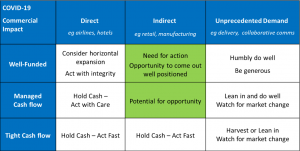Four Actions for War-Time Leaders

COVID-19 is undemocratic, quickly forcing some businesses to the brink, providing abundance to others and leaving most dangerously in the middle. We’ve heard a lot about Directly Impacted companies, for example airlines, Qantas, American, who have acted fast and cut flights. Quietly, many companies are overwhelmed by Unprecedented Demand, for example, soaring home deliveries, collaborative communication tools, Skype, Zoom. In the middle Indirectly Impacted companies have been hit by plummeting consumer confidence and/or supply chain shortages. For start-ups and those with tight cash flow, act fast to save your company – see Adir Shiffman’s great article Advice to Founders.
Indirectly Impacted companies who are well-funded have an opportunity to remake, acquire, divest and come out winning.
I’ve been here twice before: 2008/09 at Expedia; and eBay Europe post corporate hack. We didn’t get it all right. Yet there is no better training ground to spur big decisions and fast action.
There are four key actions to start now:
1. Winning in 2030 – what are the big decisions you can make now?
While everyone is worrying about tactics and next month’s budget – go long. How will your business win in 2030? What are the horizontal and vertical opportunities? What acquisitions or divestment might you make? How will your competitors respond? Chances are you have been sitting on some critical decisions waiting for the right time to pull the trigger. Governments have incentives to spur you to invest.
Now is the time to think big.
Expedia separated its Affiliates businesses, building a responsive B2B organisation that exists to this day.
eBay sold Skype in September 2009 as it was non-core – buyers and sellers don’t video conference after all.
At the very least, use this opportunity to seed one game-changing opportunity or to divest that which slows you down.
2. Wartime cabinet – encourage divergent points of view, agreement and then action
Run-the-business leadership teams build consensus and deliver through process. They spend time weighing up strategic and policy decisions.
Wartime cabinets think big, debate openly and make brave decisions supported by less detail. They act fast.
Now is the time to hear creative ideas and divergent points of view. If you’re not debating the options, roam further. Find your most critical investor. Ask Gen Z’s, Millennials, Boomers. Speak to your most outspoken critics. Hear and test all points of view.
Expedia’s leadership team had a pretty healthy debate about the breadth and depth of the 2008/09 economic crisis. Debating openly in the room. Deciding on a path. Walking in lock step to deliver the solution.
3. Data – Create Visibility
Let’s assume that COVID-19’s impact could take 3 or 6 or 18 months. Now is the time to wire up your data. You are flying the plane into a storm.
At a minimum, everyone ought to see yesterday’s sales on their phone. B2B might have a shared weekly sales view. If you have a spare dime, plug it into visibility.
Ideally build customer lifetime value tools and econometrics models creating dispassionate views of the future. If you have a second spare dime, build the data you need to fly the plane long haul.
When eBay was hacked all of our customers had to reset their passwords – many didn’t come back for a long time resulting in massive instant revenue loss. In Europe we had two days of “new world” data and great tools. It was bad news – we told it straight. Within a week of the announced hack we had re-forecast sales to profit and within two weeks made organisational decisions. The re-forecast held to within 1% through to year’s end, providing stability for the recovering business.
4. Take your team with you
Once you have chartered a course – tell your teams. Turn up. Be (virtually) visible. Outlining a plan will make everyone calmer.
eBay had weekly meetings. Expedia had Friday morning coffee and donuts.
What you do now is career defining. Think big. Stay safe.






